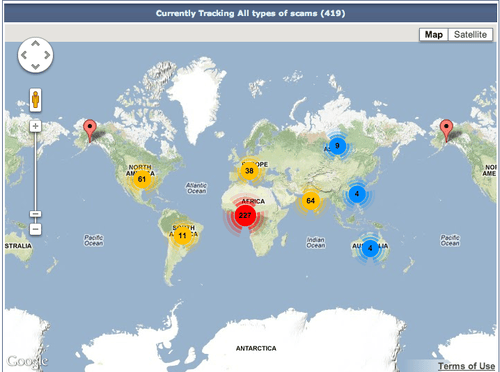You receive an email from an unknown address. The sender introduces himself as a Nigerian government official who needs several thousand dollars to grease a few hands and move a fortune out of Nigeria, which he’ll happily share with you in return.
You shake your head, throw it into the spam folder, and wonder who falls for such things.
Mentioning Nigeria seems like a dead giveaway. The country has been associated with scams for decades – dating back to the days when they took place over snail mail. Scams that ask for advance fees have even become known internationally as 419 scams after the part of Nigerian law dealing with fraud. It’s such a phenomenon, a Nigerian wrote a song about it, which you can view by clicking the picture below.
Searching the Interwebs provides explanations for Nigeria’s role in scams such as having English as a first language, corrupt and easily bribed police, and poverty coexisting with an educated population. But we’re still awaiting a definitive explanation.

Map from 419Eater showing active scams. Nigeria is in red.
So why not pretend to be from somewhere other than Nigeria? In a rare moment of being cool, Microsoft provides the answer:
While it’s free to email people, perpetrating a scam takes a lot of time and resources. The victim needs to be reeled in slowly over email and phone (a non-trivial expense when calling internationally), official looking documents may need to be forged, and many scams involve an in-person meeting.
So, scammers need people who may fall for the scam to “self-identify.” Since only the most gullible people will send thousands of dollars or their private bank information to a stranger, the more exotic the original story, the better. If someone believes that they have been randomly chosen by a Nigerian prince (who can barely spell) to share his fortune, then it won’t be a stretch to believe that he needs your bank account number.
Getting Revenge on Scammers
As ludicrous as it seems, people do fall for these scams to the tune of nearly 200 million dollars a year – and that’s just in the United States. Victims lose an average of $20,000, and some people are injured or even killed when meeting their scammers in-person.
In response, a community has organized to scambait: waste the scammers time and money. At their best, they turn the tables on scammers, baiting them with the promise of a too-good-to-be-true scam victim if they just jump through a few hoops first.
While scambaiters are mostly trying to have fun, or can seem a bit sadistic in their revenge plots, they also see themselves serving a social purpose. Since the low cost of running scams makes them economically viable, they try and raise the costs of scamming to reduce its appeal.
The Best Stories of Getting Revenge Against Scammers
Priceonomics has assembled some of our favorite scambaiting stories. And if you tell us that you don’t get a kick out of these stories, then there’s a Nigerian prince that we’d like for you to meet…
419 Eater, the most famous scambaiting community, has convinced hundreds of scammers to pose for pictures as a prerequisite to sending thousands of dollars. The best? Convincing a scammer posing as a preacher that he must get a tattoo to be initiated into the scam victim’s church before receiving donations.
2) The Incredible Shrinking Artwork
Another 419Eater member gets creative. He convinces a scammer that he heads an art dealership with very friendly scholarship opportunities. What must the scammer do to win one? Carve replicas of an animated cat and dog (from a British TV show) and a classic computer – and re-carve them when they shrink in the mail.
If you’ve ever taken a walk through Craigslist or Ebay, you’ve probably noticed how many scams are on the site. One would-be victim turns the tables on a scammer trying to cheat him out of his laptop. The scammer doesn’t get the real laptop, but he does pay a small fortune in taxes for importing the laptop.
In a segment that earns CBS news a gold star for the day, they send $4,500 of monopoly money to hire a Nigerian “lawyer” who can access a multi-million dollar fortune. Thanks to Squidoo for this gem, which features visits to an internet cafe full of scammers, a view of the wealth amassed by a 419 con man, and a sting operation on the scammer.
As a startup who recently needed to raise money, we’re partial to this one. After receiving an offer to provide seed capital for a business (the scam is to first require a “commitment fee payment” and then never send any money), the scambaiter spins a wild tale of a bakery specializing in “iced schnorrors” that needs 4 million pounds to expand from Britain into Europe. Maybe it’s because we hear some crazy startup ideas here in Silicon Valley, but we’d invest in that.
This post was written by Alex Mayyasi. Follow him on Twitter here or Google.





